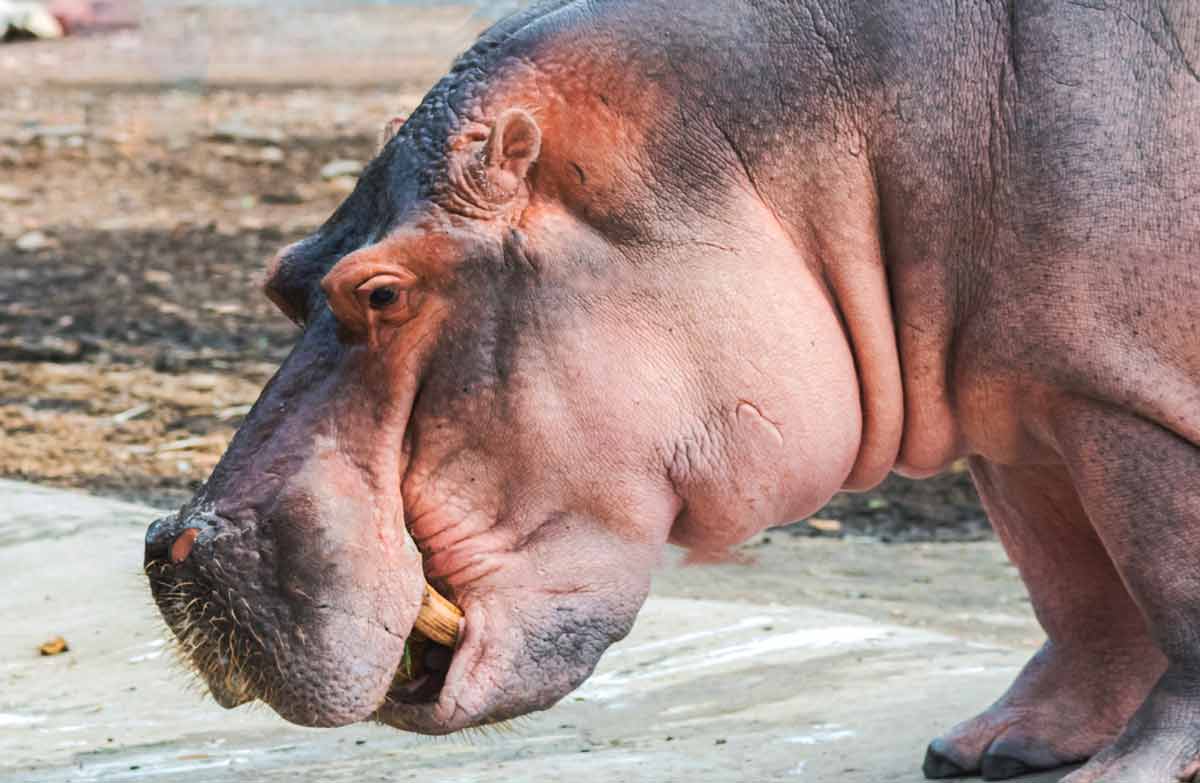Hippo Food Chain Facts: Herbivorous Lifestyle of Hippos
In the vast and intricate realm of the animal kingdom, hippos stand out as intriguing creatures with a rather unique culinary preference – they are, surprisingly, vegetarians. Despite the lack of natural predators, these colossal mammals find themselves positioned at the base of the hippo food chain. Their dietary choices, dominated by vegetation, create a distinct niche for them within their ecosystem, showcasing the fascinating diversity of life in the wild.
Dominance in the Hippo Hierarchy
While it might seem paradoxical for a creature with no natural predators to be placed at the bottom of a food chain, the paradox is resolved by the recognition that the vulnerability of the young hippos alters this hierarchy. In their early stages of life, hippos face potential threats from predators, shaping a hierarchy that fluctuates across different life stages. However, as they mature, the hippo ascends to the summit of its game, emerging as a formidable force within its habitat.
The Mighty Hippopotamus in the Food Chain
The hippopotamus, a colossal creature, ranks among the largest animals on our planet. Positioned prominently in the intricate web of the food chain, these massive herbivores play a crucial role in the delicate balance of their ecosystem. Despite their imposing size, these creatures predominantly feed on plants, exhibiting a preference for vegetation as opposed to animal matter.
The Pygmy Hippo’s Dietary Cycle
For the pygmy hippo, sustenance is a fascinating journey that begins with the intake of food into its body. This diminutive cousin of the regular hippopotamus follows a unique food chain where sunlight serves as the catalyst. As the sun energizes the grass, it becomes the primary source of nourishment for the pygmy hippo. When the hippo consumes the grass, it absorbs strength, creating a cascading effect in the food chain. Subsequently, a lion or hyena may prey upon the hippo, gaining energy. Ultimately, a crocodile, positioned at the apex of this intricate chain, consumes the lion or hyena, further amplifying its strength.
The Aquatic Lifestyle of Normal Hippos
The daily routine of a regular hippopotamus is a spectacle of nature’s grandeur. These magnificent creatures spend a substantial portion of their day—up to 16 hours—immersed in the cool embrace of rivers and lakes. Amidst this aquatic sojourn, they engage in a nocturnal feast, devouring tropical grasses with unparalleled voracity. Astonishingly, a single meal can amount to an astounding 80 to 100 pounds of sustenance, underlining the sheer enormity of their appetites.
The Environmental Impact of Hippopotamus-Vectored Subsidies
A recent study sheds light on the profound environmental significance of hippopotamus-vectored subsidies. As these colossal herbivores traverse between water bodies and their daytime resting grounds, they unwittingly distribute copious amounts of dung. This seemingly inconspicuous act plays a pivotal role in nutrient cycling within the ecosystem. Every year, millions of tons of hippo dung enrich Africa’s aquatic environment, contributing to the overall health and vitality of the region.
Hippo, the Unrivaled Giant
One might assume that the absence of natural predators implies a certain ease in the life of a hippo, yet the reality is that these creatures, despite their vegetarian inclination, command a presence that even strikes fear into the hearts of formidable predators. Astonishingly, crocodiles, renowned for their predatory prowess, are known to harbor a palpable fear of hippos. The mere presence of a hippo in the water sends ripples of trepidation through the crocodile community, highlighting the unparalleled dominance of these colossal herbivores. How AI, ChatGPT maximizes earnings of many people in minutes
The Unlikely Environmental Role of Hippo Deposits
Contrary to common belief, the deposits left by hippos play a surprisingly vital role in the environment. A recent survey conducted by researchers led by Douglas McCauley at UC Santa Barbara has unveiled a fascinating revelation about the ecological significance of hippo dung. According to their findings, the organic matter produced by hippos serves as a crucial nutrient source for a variety of river fish and aquatic insects. This groundbreaking discovery challenges previous assumptions and sheds light on the intricate connections between terrestrial and aquatic ecosystems.
Hippo Nutrients: A Boost for Aquatic Life
The study not only underscores the ecological importance of hippo-vectored subsidies but also employs sophisticated chemical analysis tools to demonstrate the direct utilization of hippo-derived nutrients by aquatic organisms. Assistant Professor McCauley, an expert in environmental science at UCSB, emphasizes the significance of these findings in the context of evolution and marine biology. The revelation challenges conventional wisdom, revealing a nuanced understanding of the dynamic interplay between different components of the ecosystem. Motivation – Mind – Success – Thinking – Productivity – Happiness
Bridging Ecosystem Gaps: A Crossroads of Life
In the realm of ecology, the flow of materials and energy within ecosystems is a subject of keen interest. Assistant Professor McCauley highlights the dichotomy between aquatic and terrestrial ecosystems, emphasizing their distinctiveness. However, the study suggests a paradigm shift, showcasing how wildlife such as hippos creates vital connections across these seemingly disparate realms. The research not only breaks down the perceived barriers between these ecosystems but also affirms that rivers in areas influenced by hippos share essential elements of the Earth’s environment, such as nutrition and energy.

